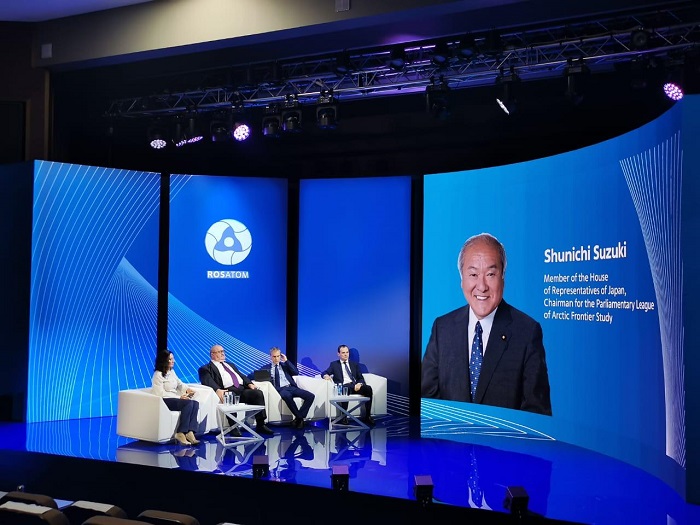On June 24, ROSATOM hosted the "Northern Sea Route: Prospects and Opportunities" workshop. The event aimed at promoting the Japan-Russia dialogue on the joint Northern Sea Route (NSR) projects was held in a hybrid format: the attendees gathered in Tokyo, while Rosatom speakers joined in from a studio in Moscow - everything was broadcast on ROSATOM's online platform.
A significant increase in the freight traffic along the NSR gives way to the discussion of the prospects for creating a modern global transport route, which, in addition to traditional transport corridors, will connect Northeast, East and Southeast Asia with Europe. It is important to note that the NSR infrastructure is being developed keeping the sustainable development goals as a priority.

More than 200 people took part in the workshop, including representatives of the Ministry of Land, Infrastructure, Transport and Tourism of Japan, representatives of Mitsui O.S.K. Lines., Ltd., Marubeni, Mitsubishi, the Russian Embassy to Japan. On behalf of ROSATOM, Vladimir Panov, ROSATOM's special representative for the Arctic development, Alexander Neklyudov, Director General of Rusatom Cargo, Olga Kirdey, First Deputy Director General for International Business, Sustainability and Digital Transformation at Rusatom Cargo, Anton Moskvin, Vice President - Business Development and Marketing at Rusatom Overseas, Sergei Demin, Director of Rosatom Japan, and others spoke at the workshop.
During the workshop, the parties discussed such issues as efficiency and safety of the NSR operation, as well as the NSR benefits for Japanese business.
“I am sure that the creation of this new transport artery will undoubtedly give us additional opportunities for various joint projects,” Vyacheslav Ruksha, Deputy Director General - Director of the Northern Sea Route Directorate of ROSATOM, noted.
For reference:
ROSATOM has been the infrastructure operator of the Northern Sea Route since 2018. ROSATOM has embarked on a large-scale modernization of the icebreaker fleet, while providing for the construction and maintenance of the state port infrastructure, making hydrographic measurements of shipping routes of the NSR area, and organizing the ship traffic. In addition, ROSATOM is implementing a number of commercial projects related to the construction of its own cargo fleet and cargo terminals, as well as the development of technologies for the commercial production and transportation of hydrogen.
By the end of 2020, the NSR freight traffic reached almost 33 million tons. The forecast for the increase of the NSR freight to 80 million tons by 2024 is based on the reliable industrial and actual economic references including large projects for extraction of mineral raw materials, primarily petroleum and gas, as well as for transit freight traffic.
The main task of ROSATOM is to transform the Northern Sea Route into a year-round navigation route that meets all the international standards, in terms of both safety and the quality of services. and service.
